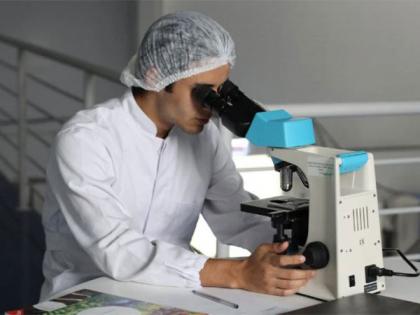AI-designed DNA controls genes in healthy mammalian cells for first time: Study
By ANI | Updated: May 9, 2025 16:07 IST2025-05-09T16:00:25+5:302025-05-09T16:07:35+5:30
Washington DC [US], May 9 : A recent study marks the first reported instance of generative AI designing synthetic ...

AI-designed DNA controls genes in healthy mammalian cells for first time: Study
Washington DC [US], May 9 : A recent study marks the first reported instance of generative AI designing synthetic molecules that can successfully control gene expression in healthy mammalian cells.
As a proof-of-concept, the authors of the study asked the AI to design synthetic fragments which activate a gene coding for a fluorescent protein in some cells while leaving gene expression patterns unaltered.
They created the fragments from scratch and dropped them into mouse blood cells, where the sequence fused with the genome at random locations.
The experiments worked exactly as predicted and pave the way for new strategies to give instructions to a cell and guide how they develop and behave with unprecedented accuracy.
The model can be told to create synthetic fragments of DNA with custom criteria, for example: 'switch this gene on in stem cells which will turn into red-blood-cells but not platelets.'
The model then predicts which combination of DNA letters (A, T, C, G) are needed for the gene expression patterns required in specific types of cells.
Researchers can then chemically synthesise the roughly 250-letter DNA fragments and add them to a virus for delivery into cells.
"The potential applications are vast. It's like writing software but for biology, giving us new ways of giving instructions to a cell and guiding how they develop and behave with unprecedented accuracy," says Dr. Robert Fromel, first author of the study who carried out the work at the Centre for Genomic Regulation (CRG) in Barcelona.
The study could lead to new ways for gene-therapy developers to boost or dampen the activity of genes only in the cells or tissues that need adjusting. It also paves the way for new strategies to fine-tune a patient's genes and make treatments more effective and reduce side effects.
The work marks an important milestone in the field of generative biology. To date, advances in the field have largely benefited protein design, helping scientists create entirely new enzymes and antibodies faster than ever before. However, many human diseases stem from faulty gene expression that is cell-type specific, for which there might never be a perfect protein drug candidate.
AI-generated enhancers can help engineer ultra-selective switches that nature has not yet invented. They can be designed to have exactly the on/off patterns required in specific types of cells, a level of fine-tuning which is crucial for creating therapies that avoid unintended effects in healthy cells.
However, the development of AI models requires lots of high-quality data, which has been historically lacking for enhancers.
"To create a language model for biology, you have to understand the language cells speak. We set out to decipher these grammar rules for enhancers so that we can create entirely new words and sentences," explains Dr. Lars Velten, corresponding author of the study and researcher at the Centre for Genomic Regulation (CRG).
Disclaimer: This post has been auto-published from an agency feed without any modifications to the text and has not been reviewed by an editor
Open in app